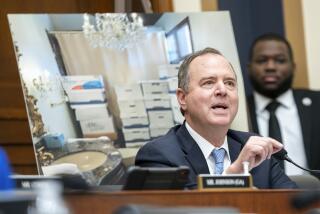With Benghazi bullet dodged, Democrats’ fate rests with Hillary
The Senate Intelligence Committee has delivered a damning report about the catastrophe at the American mission in Benghazi, Libya, casting the blame widely -- at the CIA, the Pentagon, the State Department and even at one of the victims of the attack, U.S. Ambassador Chris Stevens. But despite an addendum tacked on by Republican members of the committee that took a hard swipe at Hillary Rodham Clinton, not much damage was done to the former secretary of State’s prospects as a presidential candidate.
Thursday on the Senate floor, Republican Sens. John McCain, Lindsey Graham and Kelly Ayotte tried to make it sound as though the report laid blame for the tragedy on Clinton, but the Democratic chair of the intelligence panel, California Sen. Dianne Feinstein, quickly refuted that assertion.
“The report approved on a bipartisan basis says no such thing,” Feinstein said. “As a matter of fact, Secretary Clinton is not mentioned a single time in the 58-page bipartisan section of our Benghazi report.”
Not a single mention? That dodged bullet means that no matter what GOP attack ads say, middle-of-the-road voters are likely to see Benghazi as just another murky, partisan spat that they will discount in making their choice for president in 2016.
Democrats can breathe a sigh of relief. Were the Benghazi issue ever to catch fire outside the spin machine of Fox News and right-wing radio and Clinton went down in flames, the party would have no obvious candidate standing ready to fill her place -- at least no candidate with the same popularity, fundraising potential and vast political organization.
The cover story in the upcoming issue of Time magazine does a good job outlining the high promise and worrying peril of Clinton’s preeminence in the Democratic field. On one hand, it would appear that she could hold on to the majorities that twice put Barack Obama in the White House and add to them by intensifying support among women and blue-collar voters. By that scenario, no Republican stands a chance against her.
But, on the other hand, stuff happens and two years in politics is a long time. If not Benghazi, then something else could weaken her appeal before the 2016 nominating convention. If such a slide should come late in the game, Democrats would have a mad scramble to find a replacement. That is the risk of putting so much hope and faith in a single choice.
As the Time article points out, Clinton is not yet an official candidate and keeps herself in a better position politically by continuing to play coy about running. All the pieces of a potent campaign are in place and ready to roll, so she has nothing to lose by remaining above the fray for as long as she can. This interplay of inevitability and uncertainty also keeps most potential rivals for the nomination on the sidelines.
The only man who appears bold enough to take Clinton on is Brian Schweitzer, the former Montana governor. Schweitzer is a Western-style Democrat who could have a strong appeal among rural constituencies that have not warmed to Democrats for many long years, but in a recent MSNBC interview, he could not come up with a single nice thing to say about the Obama administration. That will not endear him to very many Democrats.
Besides, there is that glass-ceiling thing. Neither Schweitzer nor any other male Democrat can make history the way Clinton can. She is the first woman to have such a strong chance to become president. Perhaps above anything else, that is why the Democratic Party will accept the risk and put its fate in her hands.
More to Read
A cure for the common opinion
Get thought-provoking perspectives with our weekly newsletter.
You may occasionally receive promotional content from the Los Angeles Times.







